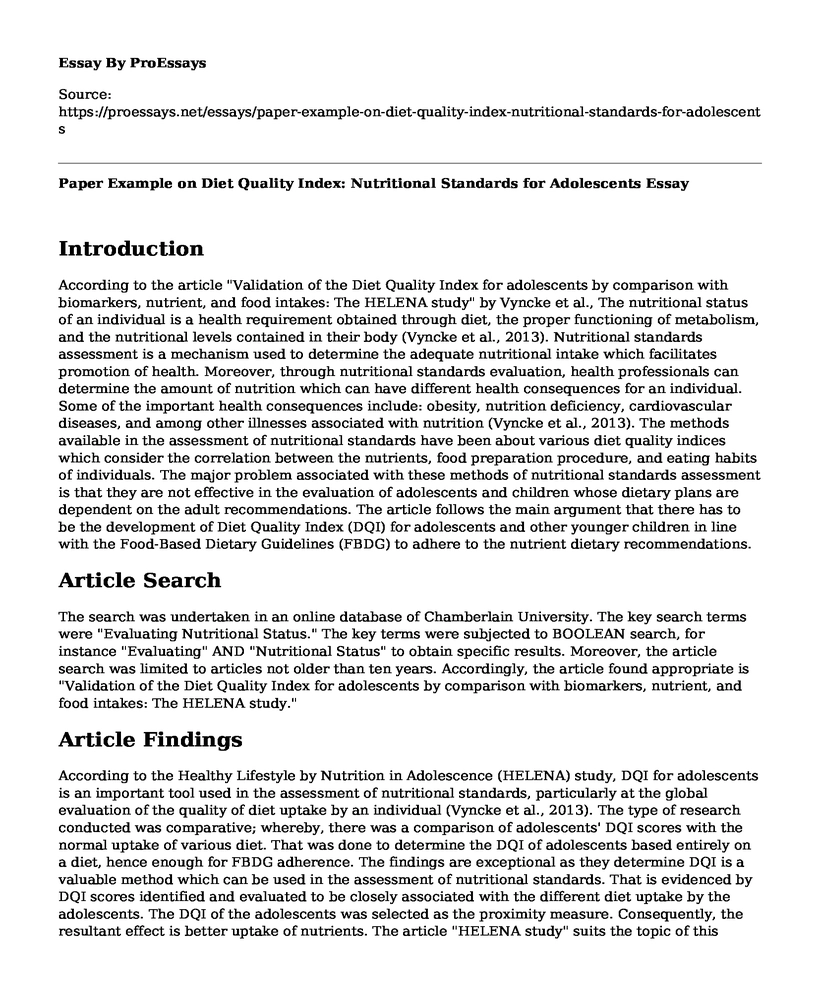Introduction
According to the article "Validation of the Diet Quality Index for adolescents by comparison with biomarkers, nutrient, and food intakes: The HELENA study" by Vyncke et al., The nutritional status of an individual is a health requirement obtained through diet, the proper functioning of metabolism, and the nutritional levels contained in their body (Vyncke et al., 2013). Nutritional standards assessment is a mechanism used to determine the adequate nutritional intake which facilitates promotion of health. Moreover, through nutritional standards evaluation, health professionals can determine the amount of nutrition which can have different health consequences for an individual. Some of the important health consequences include: obesity, nutrition deficiency, cardiovascular diseases, and among other illnesses associated with nutrition (Vyncke et al., 2013). The methods available in the assessment of nutritional standards have been about various diet quality indices which consider the correlation between the nutrients, food preparation procedure, and eating habits of individuals. The major problem associated with these methods of nutritional standards assessment is that they are not effective in the evaluation of adolescents and children whose dietary plans are dependent on the adult recommendations. The article follows the main argument that there has to be the development of Diet Quality Index (DQI) for adolescents and other younger children in line with the Food-Based Dietary Guidelines (FBDG) to adhere to the nutrient dietary recommendations.
Article Search
The search was undertaken in an online database of Chamberlain University. The key search terms were "Evaluating Nutritional Status." The key terms were subjected to BOOLEAN search, for instance "Evaluating" AND "Nutritional Status" to obtain specific results. Moreover, the article search was limited to articles not older than ten years. Accordingly, the article found appropriate is "Validation of the Diet Quality Index for adolescents by comparison with biomarkers, nutrient, and food intakes: The HELENA study."
Article Findings
According to the Healthy Lifestyle by Nutrition in Adolescence (HELENA) study, DQI for adolescents is an important tool used in the assessment of nutritional standards, particularly at the global evaluation of the quality of diet uptake by an individual (Vyncke et al., 2013). The type of research conducted was comparative; whereby, there was a comparison of adolescents' DQI scores with the normal uptake of various diet. That was done to determine the DQI of adolescents based entirely on a diet, hence enough for FBDG adherence. The findings are exceptional as they determine DQI is a valuable method which can be used in the assessment of nutritional standards. That is evidenced by DQI scores identified and evaluated to be closely associated with the different diet uptake by the adolescents. The DQI of the adolescents was selected as the proximity measure. Consequently, the resultant effect is better uptake of nutrients. The article "HELENA study" suits the topic of this article well because it offers a comparison of DQI with the eating habits of the adolescents (Vyncke et al., 2013). That is important because eating habits have been associated with dietary guidelines. Hence, the Diet Quality Index is shown to be an important method of assessing nutritional standards as provided for by FBDG.
Evidence for Practice
In summary, the Diet Quality Index of the Adolescents (DQI-A) is essential to facilitate the assessment of the general quality of diet in an individual during healthcare delivery. However, it is evident the method best applies to situations of long-term dietary intake. One particular concern within the study article is the difference existing between the non-under reporters (high energy intake) and the under-reporters (less energy intake) (Vyncke et al., 2013). Determination of energy intake is important to bring about the differences between the observed results and the actual nutritional status. For instance, when BMI is higher in adolescents, they are expected to have a less healthy nutritional habit.
Sharing of Evidence
The evidence (information) from the study is shared with the nurses. Sharing of evidence is done through the use of resources that include: occasional training and seminars. Therefore, the study plays a vital role in the nursing practice as it will facilitate easier identification and evaluation of nutritional uptake of the patients. When the nutritional status of the patients' is properly considered, their general health status improves. That is because patients will be allocated proper nutrition suiting their dietary needs.
Conclusion
The development of the Diet Quality Index (DQI) is an essential tool which can be used in the process of assessing nutritional standards of the adolescents. The nutritional status has been determined to be affected by diverse factors. These factors include: nutrients, food preparation procedure, and eating habits of individuals. Hence, nurses can apply these factors in the calculation of DQI to achieve the promotion of health. Only through the development of the Diet Quality Index (DQI) is when individuals will adhere to nutrient dietary recommendations.
Reference
Vyncke, K., Cruz, E., Fajo-Pascual, M., Cuenca-Garcia, M., De Keyzer, W., & Kersting, M. et al. (2013). Validation of the Diet Quality Index for adolescents by comparison with biomarkers, nutrient, and food intakes: The HELENA study. British Journal of Nutrition, 7(1), 2068-2076. doi: 10.1017/S000711451200414X
Cite this page
Paper Example on Diet Quality Index: Nutritional Standards for Adolescents. (2023, Jan 16). Retrieved from https://proessays.net/essays/paper-example-on-diet-quality-index-nutritional-standards-for-adolescents
If you are the original author of this essay and no longer wish to have it published on the ProEssays website, please click below to request its removal:
- Essay Sample on Being Unique in a World of Clones
- Genetics in Treating and Developing Cancer Paper Example
- Essay on COVID-19 Travel Restrictions: US Defense Secretary Implements Changes
- Essay Example on COVID-19 Impacts: Hospitality Industry Hit Hardest by Pandemic
- Essay Example on COVID-19 Impact: US vs. Canada - Uncompared Statistics and Unequal Outcomes
- Essay Example on Latest Update on Covid-19 Pandemic: What You Need to Know
- Essay Example: Online Learning and Online Safety







